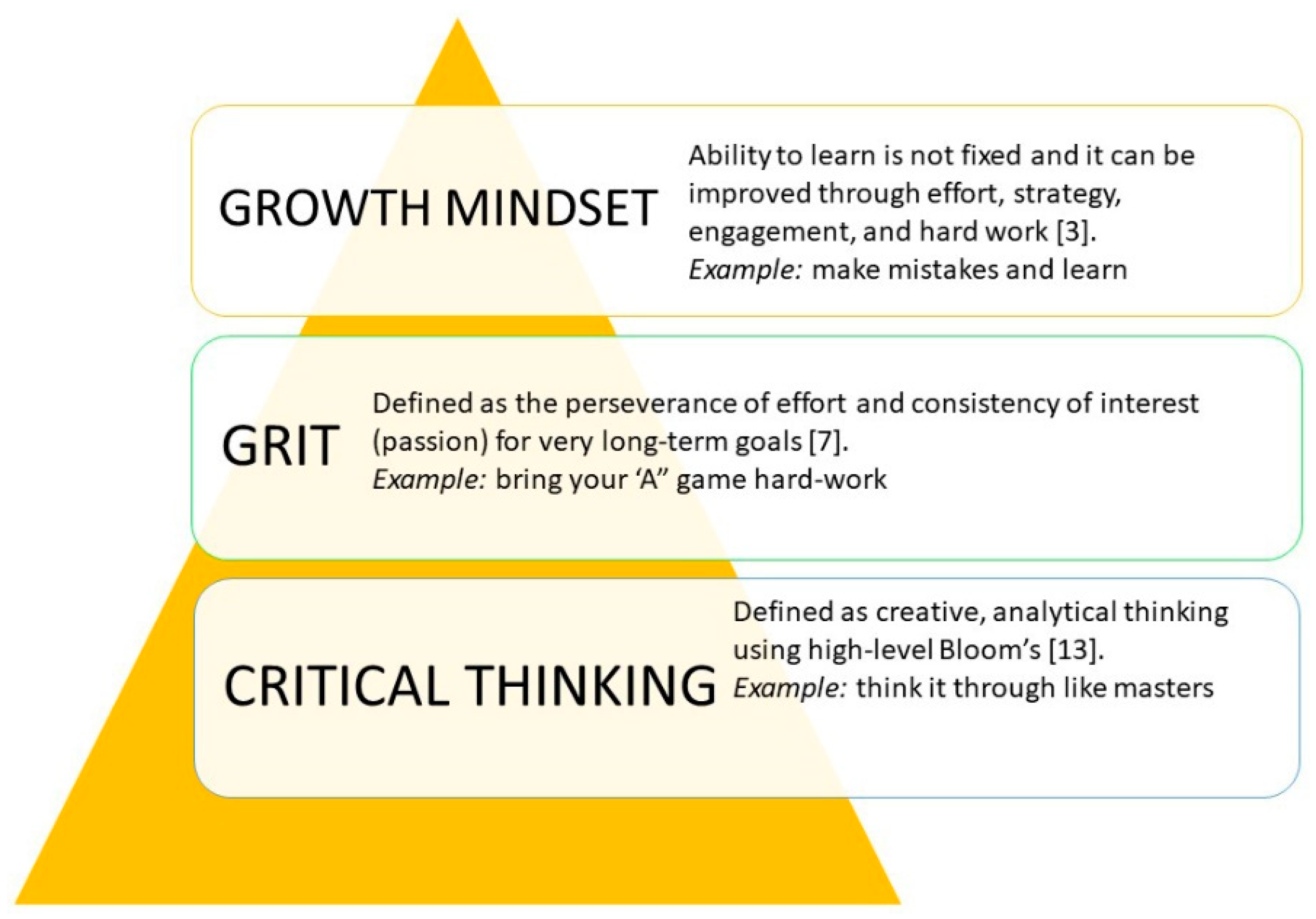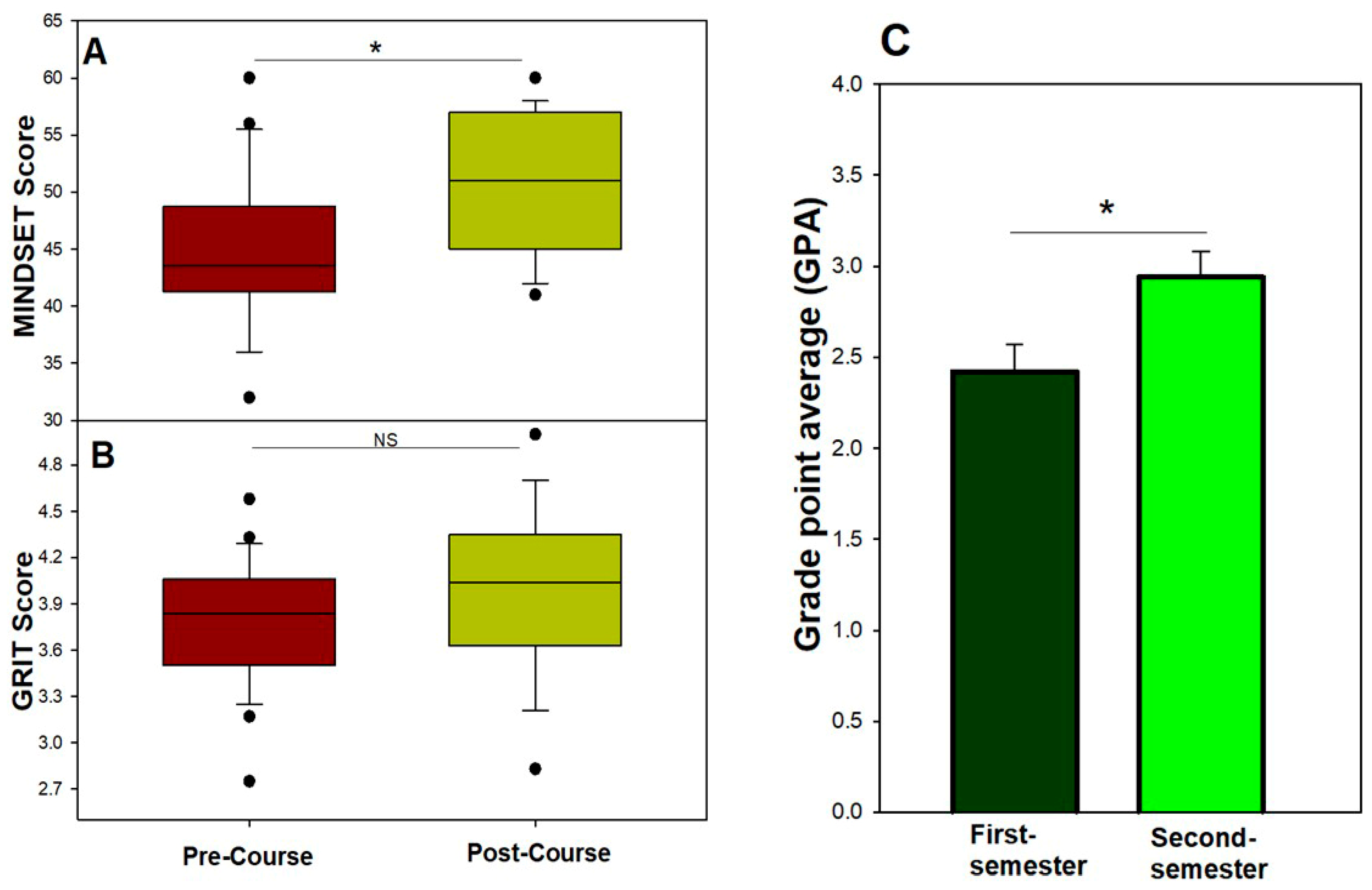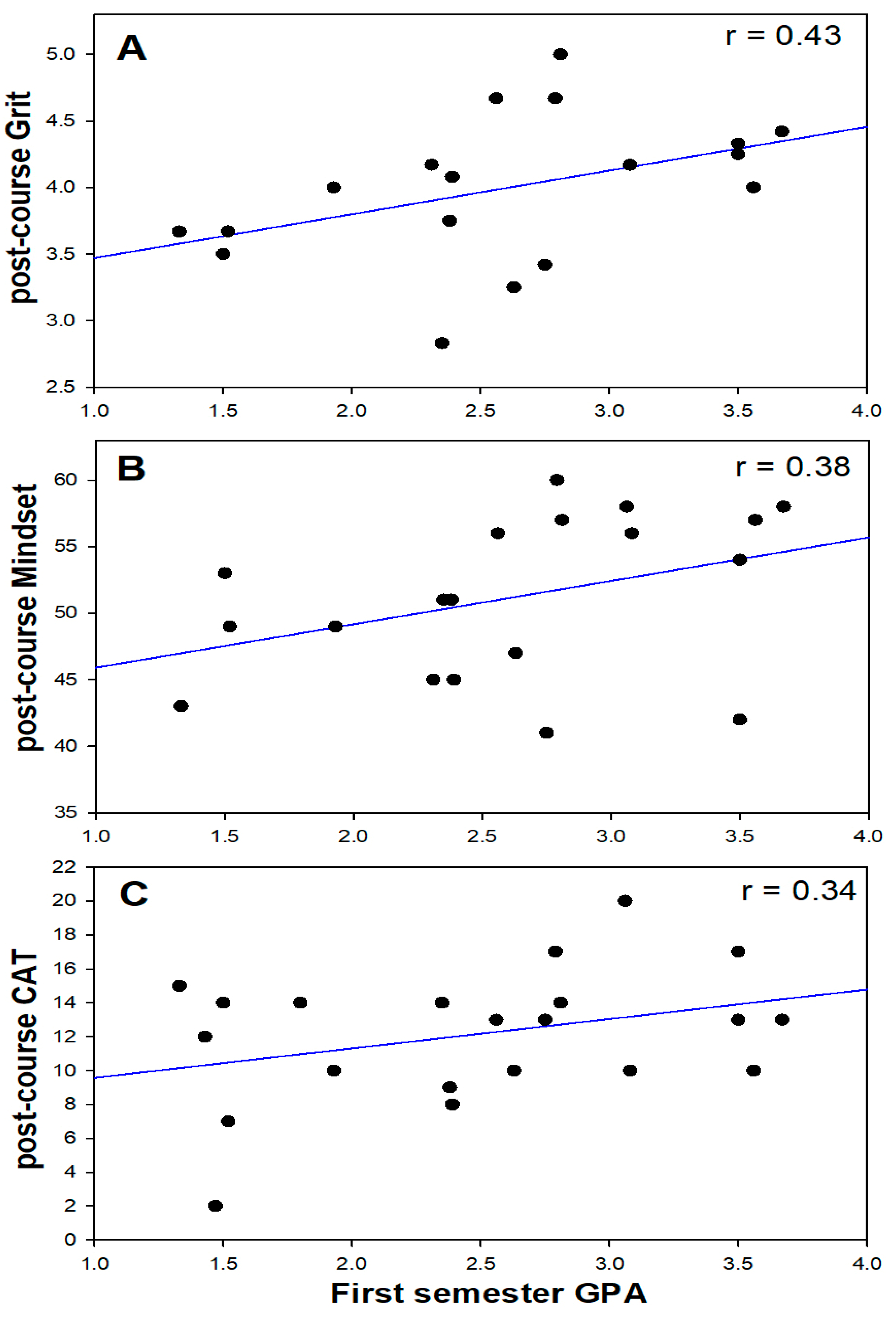Enhancing Undergraduate Student Success in STEM Fields through Growth-Mindset and Grit
Abstract
:1. Introduction
2. Materials and Methods
2.1. Course Structure and Assessment
2.2. Measurements of Growth Mindset, Grit, and Critical Thinking
2.3. Ethics Statement
2.4. Data Analysis
3. Results
3.1. Pre- and Post-Course Testing of Mindset, Grit, and Critical Thinking
3.2. First-Semester and Second Semester GPA
3.3. Relationship between Student Grit, Growth Mindset, and Critical Thinking Elements
3.4. Academic Rank Outcomes
3.5. Student Reactions to the ISC1058 Course
4. Discussion
5. Conclusions
Supplementary Materials
Author Contributions
Funding
Acknowledgments
Conflicts of Interest
References
- Deloitte and The Manufacturing Institute. Skills Gap and the Future of Work Study. 2018. Available online: https://documents.deloitte.com/insights/2018DeloitteSkillsGapFoWManufacturing (accessed on 15 September 2020).
- Costa, A.; Kallick, B. Learning and Leading with Habits of Mind: 16 Essential Characteristics for Success; Association for Supervision and Curriculum Development: Alexandria, Egypt, 2008. [Google Scholar]
- Dweck, C.S. Mindset: The New Psychology of Success; Random House Pub. Group: New York, NY, USA, 2006. [Google Scholar]
- Blackwell, L.S.; Trzesniewski, K.H.; Dweck, C.S. Implicit Theories of Intelligence Predict Achievement Across an Adolescent Transition: A Longitudinal Study and an Intervention. Child. Dev. 2007, 78, 246–263. [Google Scholar] [CrossRef]
- Yeager, D.S.; Dweck, C.S. Mindsets That Promote Resilience: When Students Believe That Personal Characteristics Can Be Developed. Educ. Psychol. 2012, 47, 302–314. [Google Scholar] [CrossRef]
- Yeager, D.S.; Hanselman, P.; Walton, G.M.; Murray, J.S.; Crosnoe, R.; Muller, C.; Tipton, E.; Schneider, B.; Hulleman, C.S.; Hinojosa, C.P.; et al. A national experiment reveals where a growth mindset improves achievement. Nature 2019, 573, 364–369. [Google Scholar] [CrossRef] [PubMed] [Green Version]
- Duckworth, A.L. Grit: The Power of Passion and Perseverance; Scribner: New York, NY, USA, 2016. [Google Scholar]
- Duckworth, A.L.; Quinn, P.D. Development and validation of the Short Grit Scale (Grit-S). J. Pers. Assess. 2009, 91, 166–174. [Google Scholar] [CrossRef] [PubMed]
- Duckworth, A.L.; Quirk, A.; Gallop, R.; Hoyle, R.H.; Kelly, D.R.; Matthews, M.D. Cognitive and noncognitive predictors of success. Proc. Natl. Acad. Sci. USA 2019, 116, 23499–23504. [Google Scholar] [CrossRef] [PubMed] [Green Version]
- Kelly, D.R.; Matthews, M.D.; Bartone, P.T. Grit and hardiness as predictors of performance among West Point cadets. Mil. Psychol. 2014, 26, 327–342. [Google Scholar] [CrossRef]
- Lucas, G.M.; Gratch, J.; Cheng, L.; Marsella, S. When the going gets tough: Grit predicts costly perseverance. J. Res. Pers. 2014, 59, 15–22. [Google Scholar] [CrossRef]
- Barshay, J. Research Scholars to Air Problems with Using ‘Grit’ at School. 2019. Available online: https://hechingerreport.org (accessed on 15 September 2020).
- Crede, M.; Tynan, M.; Harms, P.D. Much ado about grit: A meta-analytic synthesis of the grit literature. J. Personal. Soc. Psychol. 2017, 113, 492–511. [Google Scholar] [CrossRef] [PubMed]
- Crede, M. What shall we do about grit? a critical review of what we know and what we don’t know. Educ. Res. 2018, 47, 606–611. [Google Scholar] [CrossRef] [Green Version]
- Muenks, K.; Yang, J.S.; Wigfield, A. Associations between grit, motivation, and achievement in high school students. Motiv. Sci. 2018, 4, 158–176. [Google Scholar] [CrossRef]
- Paul, R.; Elder, L. The Miniature Guide to Critical Thinking Concepts and Tools; The Foundation for Critical Thinking Press: Dillon Beach, CA, USA, 2008. [Google Scholar]
- Stein, B.S.; Haynes, A.F.; Redding, M.; Ennis, T.; Cecil, M. Assessing Critical Thinking in STEM and Beyond. In Innovations in E-learning, In-struction Technology, Assessment, and Engineering Education; Springer: Dordrecht, The Netherlands, 2017; pp. 79–82. [Google Scholar]
- Han, C.; Farruggia, S.P.; Moss, T.P. Effects of Academic Mindsets on College Students’ Achievement and Retention. J. Coll. Stud. Dev. 2017, 58, 1119–1134. [Google Scholar] [CrossRef]
- Diehl, E. Classroom 2.0—Motivating Students with Mindset Coaching and How Brains Work (Dweck). 2008. Available online: http://www.classroom20.com/forum/topics/motivating-students-with (accessed on 15 September 2020).
- Kannangara, C.S.; Allen, R.E.; Waugh, G.; Nahar, N.; Khan, S.Z.N.; Rogerson, S.; Carson, J. All that glitters is not grit: Three studies of grit in university students. Front. Psychol. 2018, 9, 1539. [Google Scholar] [CrossRef] [PubMed] [Green Version]
- Babic, T.; Papic, S.; Babic, M. The importance of multiple intelligences and growth mindset—Research among students of University College Algebra. MIPRO 2018, 835–840. [Google Scholar] [CrossRef]
- Kannangara, C.S.; Allen, R.; Carson, J.; Khan, S.; Waugh, G.; Kandadi, K. Onwards and upwards: The development, piloting and validation of a new measure of academic tenacity- the Bolton Uni-Stride Scale (BUSS). PLoS ONE 2020, 15, e0235157. [Google Scholar] [CrossRef] [PubMed]
- Hacisalihoglu, G.; Stephens, D.; Johnson, L.; Edington, M. The use of active learning approach in a SCALE-UP learning space improves academic performance in undergraduate general biology. PLoS ONE 2018, 13, e0197916. [Google Scholar] [CrossRef] [PubMed]
- Hacisalihoglu, G.; Hilgert, U.; Nash, E.B.; Micklos, D.A. An innovative plant genomics and gene annotation program for high school, community college, and university faculty. CBE—Life Sci. Educ. 2008, 7, 310–316. [Google Scholar] [CrossRef] [PubMed] [Green Version]
- Larson, J.; Barnard, W.; Chandler, J.; O’Donnell, M.; Savenye, W.; Zapata, C.E. Moving Beyond Technical Skills: Fostering the Development of Essential Skills Needed for a Successful Career in Engineering. Geo Congr. 2020. [Google Scholar] [CrossRef]
- Bazelais, P.; Lemay, D.J.; Doleck, T.; Hu, X.S.; Vu, A.; Yao, J. Grit, mindset, and academic performance: A study of pre-University science students. Eurasia J. Math. Sci. Technol. Educ. 2018, 14, em1615. [Google Scholar]
- Valentiner, D.P.; Mounts, N.S.; Durik, A.M.; Gier-Lonsway, S. Shyness entity mindset: Applying mindset theory to the domain of inhibited social behavior. Pers. Individ. Differ. 2011, 50, 1174–1179. [Google Scholar] [CrossRef]
- Center for Community College Engagement. A Mind at Work: Maximizing the Relationship between Mindset and Student Success. 2019. Available online: https://www.ccsse.org/NR2019/Mindset.pdf (accessed on 15 September 2020).



| Gender | |
| Female | 72% |
| Male | 28% |
| Major | |
| Bio-PreMed | 52% |
| Information Technology | 20% |
| Biology | 12% |
| Computer Science | 12% |
| Computer Engineering | 4% |
| Ethnicity/Race | |
| African American | 95% |
| White | 4% |
| Other race | 5% |
| Other Student Attributes | |
| First-generation college student | 28% |
| Taken AP science courses in high school | 24% |
| PRE-CAT | POST-CAT | ||||||||
|---|---|---|---|---|---|---|---|---|---|
| Cohort | n | Min. | Max. | Mean | SD | Min. | Max. | Mean | SD |
| Control Cohorts | |||||||||
| Fall 2014-All STEM | 53 | 3 | 21 | 12.19 | 4.51 | 2 | 21 | 11.3 | 4.57 |
| Spring 2015-Biology | 81 | 2 | 22 | 11.3 | 4.51 | 2 | 29 | 11.53 | 5.28 |
| Fall 2016-SCALEUP | 108 | 4 | 22 | 11.77 | 3.98 | 2 | 25 | 11.4 | 4.41 |
| Fall 2016-Biology | 43 | 3 | 29 | 13 | 6.1 | 3 | 26 | 13.77 | 6.45 |
| Fall 2016-BSC1010-8 | 15 | 5 | 21 | 11.2 | 4.57 | 2 | 19 | 10.36 | 5.03 |
| Fall 2016-BSC1010-9 | 15 | 7 | 18 | 12.93 | 3.65 | 8 | 18 | 13 | 3.55 |
| Fall 2016-BSC1010-10 | 15 | 6 | 17 | 10.27 | 3.17 | 4 | 17 | 10.13 | 4.31 |
| Fall 2016-BSC1010-3 | 15 | 6 | 18 | 12 | 3.4 | 6 | 19 | 11.78 | 3.51 |
| Fall 2016-BSC1010-7 | 15 | 4 | 21 | 11.53 | 5.17 | 3 | 20 | 11 | 4.87 |
| Fall 2018-All STEM | 66 | 5 | 30 | 13.65 | 4.79 | 5 | 26 | 12.48 | 4.49 |
| Experimental Cohort | |||||||||
| Fall 2019-All STEM | 79 | 5 | 22 | 12.78 | 3.67 | 2 | 25 | 12.89 | 4.39 |
| TOTAL | 505 | 4.55 | 21.91 | 12.06 | 0.98 | 3.55 | 22.27 | 11.79 | 1.14 |
| (a) Upper Group: Highest Academic Rank | |
| Student | Notes |
| Student 1 | highest CAT improvement |
| Student 2 | high MINDSET improvement |
| Student 3 | highest post-MINDSET, high CAT improvement |
| Student 4 | high CAT improvement |
| (b) Lower Group: Lowest Academic Rank | |
| Student | Notes |
| Student 22 | lowest pre-CAT |
| Student 23 | low pre-CAT |
| (a) Perceptions of Students Enrolled in ISC1058 Scientist Life Skills |
| ISC1058 greatly enhanced my GRIT and MINDSET |
| As a result of taking this course, I am more aware of critical thinking, metacognition, grit, and growth mindset. |
| I am willing to make more positive study decisions (metacognition). |
| I am more willing to put more effort, keep trying, visit during office hours, and be inspired by success. |
| I learned something new, new ideas and strategies to improve my success, and my confidence in STEM increased. |
| I learned Blooms taxonomy from remembering to creating higher-order deeper learning levels. |
| I recommend this class for the students in the future. |
| (b) What Aspects of This Course Did You Like Most? |
| The study habits I created |
| In-class activities helped better understand the material |
| Awesome class |
| My instructor was very good |
| The class was very engaging and helpful |
© 2020 by the authors. Licensee MDPI, Basel, Switzerland. This article is an open access article distributed under the terms and conditions of the Creative Commons Attribution (CC BY) license (http://creativecommons.org/licenses/by/4.0/).
Share and Cite
Hacisalihoglu, G.; Stephens, D.; Stephens, S.; Johnson, L.; Edington, M. Enhancing Undergraduate Student Success in STEM Fields through Growth-Mindset and Grit. Educ. Sci. 2020, 10, 279. https://doi.org/10.3390/educsci10100279
Hacisalihoglu G, Stephens D, Stephens S, Johnson L, Edington M. Enhancing Undergraduate Student Success in STEM Fields through Growth-Mindset and Grit. Education Sciences. 2020; 10(10):279. https://doi.org/10.3390/educsci10100279
Chicago/Turabian StyleHacisalihoglu, Gokhan, Desmond Stephens, Sonya Stephens, Lewis Johnson, and Maurice Edington. 2020. "Enhancing Undergraduate Student Success in STEM Fields through Growth-Mindset and Grit" Education Sciences 10, no. 10: 279. https://doi.org/10.3390/educsci10100279
APA StyleHacisalihoglu, G., Stephens, D., Stephens, S., Johnson, L., & Edington, M. (2020). Enhancing Undergraduate Student Success in STEM Fields through Growth-Mindset and Grit. Education Sciences, 10(10), 279. https://doi.org/10.3390/educsci10100279






